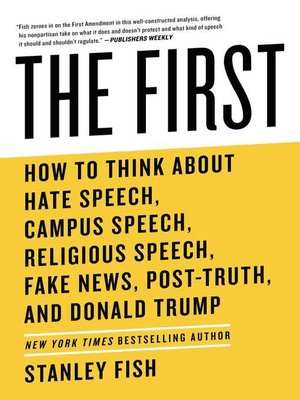The First
ebook ∣ How to Think About Hate Speech, Campus Speech, Religious Speech, Fake News, Post-Truth, and Donald Trump
By Stanley Fish

Sign up to save your library
With an OverDrive account, you can save your favorite libraries for at-a-glance information about availability. Find out more about OverDrive accounts.
Find this title in Libby, the library reading app by OverDrive.



Search for a digital library with this title
Title found at these libraries:
| Library Name | Distance |
|---|---|
| Loading... |
From celebrated public intellectual, New York Times bestselling author, and "America's most famous professor" (BookPage) comes an urgent and sharply observed look at freedom of speech and the First Amendment offering a "nonpartisan take on what it does and doesn't protect and what kind of speech it should and shouldn't regulate" (Publishers Weekly).
How does the First Amendment really work? Is it a principle or a value? What is hate speech and should it always be banned? Are we free to declare our religious beliefs in the public square? What role, if any, should companies like Facebook play in policing the exchange of thoughts, ideas, and opinions?
With clarity and power, Stanley Fish explores these complex questions in The First. From the rise of fake news, to the role of tech companies in monitoring content (including the President's tweets), to Colin Kaepernick's kneeling protest, First Amendment controversies continue to dominate the news cycle. Across America, college campus administrators are being forced to balance free speech against demands for safe spaces and trigger warnings.
With "thoughtful, dense provocations that will require close attention" (Kirkus Reviews), Fish ultimately argues that freedom of speech is a double-edged concept; it frees us from constraints, but it also frees us to say and do terrible things. Urgent and controversial, The First is sure to ruffle feathers, spark dialogue, and shine new light on one of America's most cherished—and debated—constitutional rights.
How does the First Amendment really work? Is it a principle or a value? What is hate speech and should it always be banned? Are we free to declare our religious beliefs in the public square? What role, if any, should companies like Facebook play in policing the exchange of thoughts, ideas, and opinions?
With clarity and power, Stanley Fish explores these complex questions in The First. From the rise of fake news, to the role of tech companies in monitoring content (including the President's tweets), to Colin Kaepernick's kneeling protest, First Amendment controversies continue to dominate the news cycle. Across America, college campus administrators are being forced to balance free speech against demands for safe spaces and trigger warnings.
With "thoughtful, dense provocations that will require close attention" (Kirkus Reviews), Fish ultimately argues that freedom of speech is a double-edged concept; it frees us from constraints, but it also frees us to say and do terrible things. Urgent and controversial, The First is sure to ruffle feathers, spark dialogue, and shine new light on one of America's most cherished—and debated—constitutional rights.







